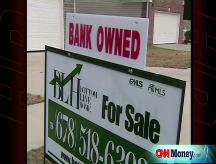Paulson, Bernanke urge Congress to act
Policymakers press for legislation aimed at reshaping the U.S. financial system. The treasury secretary says work on reforms must begin now.
 |
| Treasury Secretary Henry Paulson, left, and Federal Reserve Chairman Ben Bernanke stressed the importance of creating a system that could handle the failure of a large securities firm. |
NEW YORK (CNNMoney.com) -- Treasury Secretary Henry Paulson and Federal Reserve Chairman Ben Bernanke urged lawmakers Thursday to help modernize how the nation's beleaguered financial system is regulated.
In a joint appearance before the House Financial Services Committee, the two officials pressed for greater regulatory power of the nation's financial institutions, and the creation of a system that could handle the potential failure of a large securities firm in the wake of the near-collapse of Bear Stearns.
The Treasury chief also tried to allay some of the concerns about government-sponsored Freddie Mac (FRE, Fortune 500) and Fannie Mae (FNM, Fortune 500), following a report that government officials have begun planning for a possible collapse of the mortgage finance giants. Shares of the two firms plunged in Thursday trade even as Paulson said that the twin mortgage buyers are "working through this challenging period."
While Thursday's hearing touched on everything from the declining dollar to soaring energy prices, both Paulson and Bernanke urged lawmakers to create a system that could handle the orderly liquidation of a large securities firm. One possible model that was mentioned by Bernanke himself in a speech earlier this week would be similar to how the Federal Deposit Insurance Corp. handles the failure of a commercial bank.
Fearing further fallout in the nation's financial system, top regulators, including the Fed and the Treasury, orchestrated the rescue of Bear Stearns by JPMorgan Chase (JPM, Fortune 500) in mid-March.
Critics claimed the deal ultimately amounted to a bailout by regulators that has created a "moral hazard" for large financial institutions by encouraging them to keep taking risks without fear of failure, on top of putting billions of taxpayer dollars at risk.
Bernanke - who, along with Paulson, has taken a leading role in trying to shepherd the nation's financial system through the ongoing turmoil - once again defended the unorthodox move, adding it was warranted given the circumstances.
"This is not something I want to do again or wanted to do in the first place," he told lawmakers.
Since that time, the Fed and other top banking regulators have prodded U.S. financial institutions to raise capital, improve their liquidity positions and trim their risk exposure.
At the time, the central bank has kept open its discount lending window to investment banks, to provide temporary funding to some of the nation's largest financial institutions. Bernanke added Thursday that he, along with fellow policymakers, were considering extending the lending facility, which was originally set to expire in September.
Bernanke and Paulson also urged lawmakers to consider combining some of the agencies that now regulate the financial services industry. Some of the nation's biggest and more complex financial firms, such as investment banks and hedge funds, are subject to little government oversight.
Still, both top officials warned that changes to how the nation's financial institutions are regulated would likely take years to enact, but stressed that work must begin in earnest to help shore up the system.
"My hope is that Congress would begin soon to think about the issues," Bernanke said.
Members of the House committee appeared receptive to making changes to the current regulatory framework - including Committee Chairman Barney Frank, D-Mass. who blamed the current economic problems on an "inadequacy of regulation."
Frank did warn, however, that if lawmakers acted too quickly, they would risk getting it wrong.
"Doing it and then redoing it would be a very bad idea," he said.
Much of Paulson's recommendations, though, were rooted in the Treasury's Blueprint plan - a similar regulatory plan that he first pitched in March, just weeks after JPMorgan announced plans to buy Bear Stearns.
The plan would grant additional powers to the Federal Reserve, essentially allowing the central bank to access information from financial institutions and enabling it to step in if the nation's markets were again threatened by another Bear Stearns episode.
Up until now, the Fed has played an important - albeit much smaller - role in the U.S. financial system: setting the country's monetary policy and acting as one of the handful of regulators responsible for overseeing the nation's banking system. The new proposal would effectively transform the central bank into a financial markets moderator.
Making any regulatory changes, however, would require legislation. That may prove difficult in the midst of a presidential election year, and given resistance by some lawmakers to certain proposals.
Thursday's hearing marks the first in what is to be a series on how the nation's financial system should be regulated in light of the ongoing market crisis. ![]()


